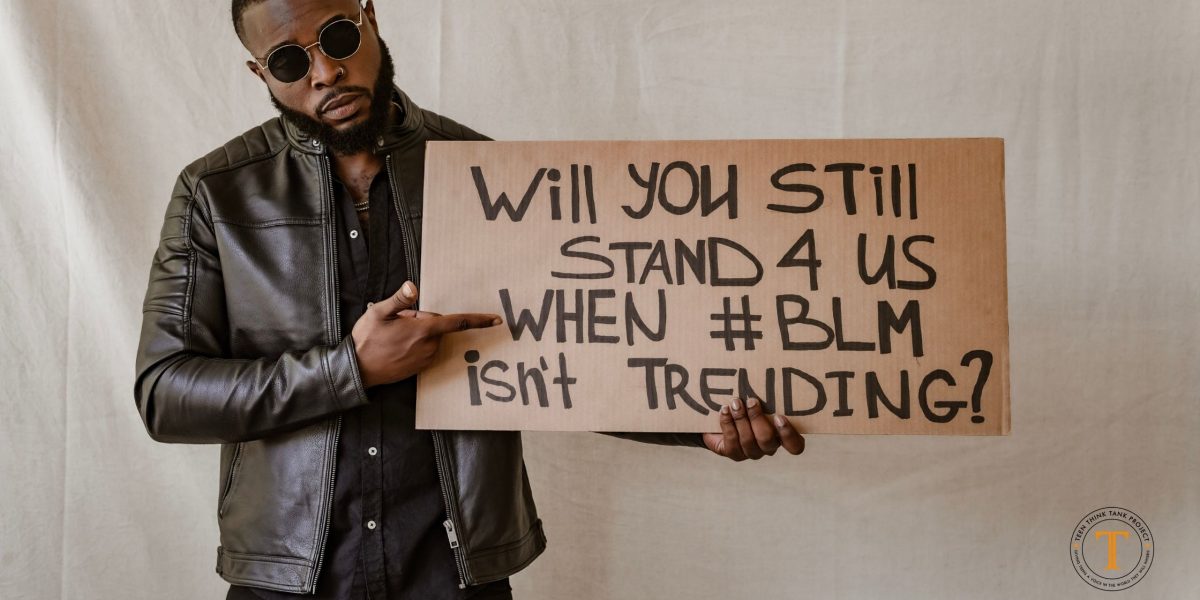The Black Lives Matter (BLM) movement formed online in 2013 after George Zimmerman, a white man, was acquitted of charges in the killing of Treyvon Martin, a black teenager, in Florida. The acquittal of Zimmerman was another chapter in the long story of white men being acquitted in the unprovoked death of a black individual.
Sadly, many more chapters would be written after Treyvon’s death; but the story always ended the same way: the public would proclaim outrage, reforms would be discussed, #blacklivesmatter would trend, and then the media coverage would subside, legislation would be lost in Congress, and society would move on without substantial change. All the while, more black (and brown and other people of color) lives would be lost in much the same fashion.
In May of 2020, George Floyd, an unarmed black man, lost his life after his neck was knelt on by a white police officer, Derek Chauvin, for over eight minutes. Floyd’s cries for help, Chauvin’s merciless actions, and the inaction of surrounding police officers were caught on tape by a bystander. The horrific ordeal was broadcast around the globe and the world saw the evidence of what black people have told us had been happening to them for years.
Floyd’s murder, in the midst of a pandemic, set off a fire storm and brought tens of thousands of people into the streets of major cities across the globe, the pinnacle of which was in June. Once again #blacklivesmatter was trending.
Sadly, despite the significant uproar and unprecedented protests, black lives were still lost. In Georgia, Ahmaud Arbery was fatally shot after being chased by three white men while he was jogging in a predominantly white neighborhood. Breonna Taylor was murdered in her bedroom after white police officers stormed her Louisville, KY apartment in error with a “no knock warrant”.
It’s been two years since George Floyd’s death and the world collectively rallied around the BLM movement, but have things changed?
On a social level, there is greater awareness of and support behind BLM. The topic of racial disparities is far more prominent in the media and the deaths of black people by white people garners increased media coverage. There appears to be significant awareness of racism and systemic racism among the Teen Think Tank Project research associates, which is a promising sign that the next generation of leaders acknowledge the issue and are impassioned to address it. However, in parts of our society there is a continued, and even a renewed assault on the black community.
Critical Race Theory (CRT) has been distorted and politicized as a rallying cry for far-right candidates seeking office. Martin Luther King Jr.’s words against racism have been contorted by white politicians to gaslight their constituents with claims of reverse racism against white people. Gerrymandering is suppressing the black and brown vote in order to elect white politicians to districts made up of predominantly minority constituents. BLM’s mantra of “Defund the Police” was distorted to depict a lawless society rather than protecting minority communities that were experiencing high levels of violence by law enforcement.
On a positive note, President Biden signed the George Floyd Justice In Policing Act in May 2022, two years after Floyd’s death. Biden’s executive order, which will reform the police, is cause for optimism; however, it should not go unnoticed that Rep. Karen Bass (D-CA), Rep. Jerrold Nadler (D-NY), Senator Cory Booker (D-NJ), and Senator Kamala Harris (D-CA) introduced this legislation two years prior. It passed in the House twice, but failed to make it through the Senate. To date, Congress has failed to pass any major legislation on police reform.
All is not lost on the political front. Local municipalities have passed legislation to address police reform. Mental health has become a major topic in public discourse, and police forces are working with public health departments to adjust their responses to people suffering from mental health disorders.
Listen to Transforming Access to Behavioral Health w/ Gillian Gmitter, a Licensed Professional Counselor in the state of Virginia, on Here’s the Problem podcast. Gillian talks about providing services to people who already have a hard time accessing care in the community, breaking down stigmas surrounding mental health and transforming behavioral healthcare in Virginia.
In spite of some progress made in addressing racism through legislation, the pandemic highlighted the pervasive racial inequalities in our society in health outcomes. Black, brown and other people of color died of Covid at disproportionately higher rates than white people. Barriers to quality healthcare continue to exist in black communities. Whether it is unconscious bias, historical trauma of the Tuskegee experiences that deter black people from getting vaccines, or a higher likelihood of living in close quarters with other people that allowed the virus to spread more easily.
So where are we, two years after the world responded, in force, to George Floyd’s murder? I believe we are making progress in responding to racial inequality as a society and appear to be more galvanized in responding to racism and investing in DEI initiatives that address systemic racism. However, this awareness and determination to fight racism is met with an alarming rise of white supremacy in the mainstream media, supported by unprecedented efforts by politicians and media influencers to promote their ideologies and demonize efforts to create racial awareness and equity.
As activists and change agents, we must continue to speak out against this hatred and misinformation. We must also use our voices at the ballot box to vote for candidates who support racial equality and unequivocally denounce racism. We can also continue to promote opportunities for diversity and inclusion within our schools, organizations, and community. We must support non-profit organizations fighting racism (especially those run by people of color), and by speaking out against racism when we see or hear it in our own communities, families, and homes. Most importantly, we need to continue fighting racism even when #blacklivesmatter isn’t trending.
Sources and Additional Reading
- Ahmaud Arbery: What you need to know about the case – BBC News
- George Floyd is killed by a police officer, igniting historic protests – HISTORY
- House Passes George Floyd Justice In Policing Act | Congresswoman Karen Bass
- President Biden Signs George Floyd Justice In Policing Act 2 Years After Floyd’s Murder (yahoo.com)
The Teen Think Tank Project provides students with a robust social justice education, along with a curriculum that fosters the professional skills required to become effective leaders and create real change. Join our community of changemakers and check out how we give socially conscious high school students a voice in the world they will inherit!



